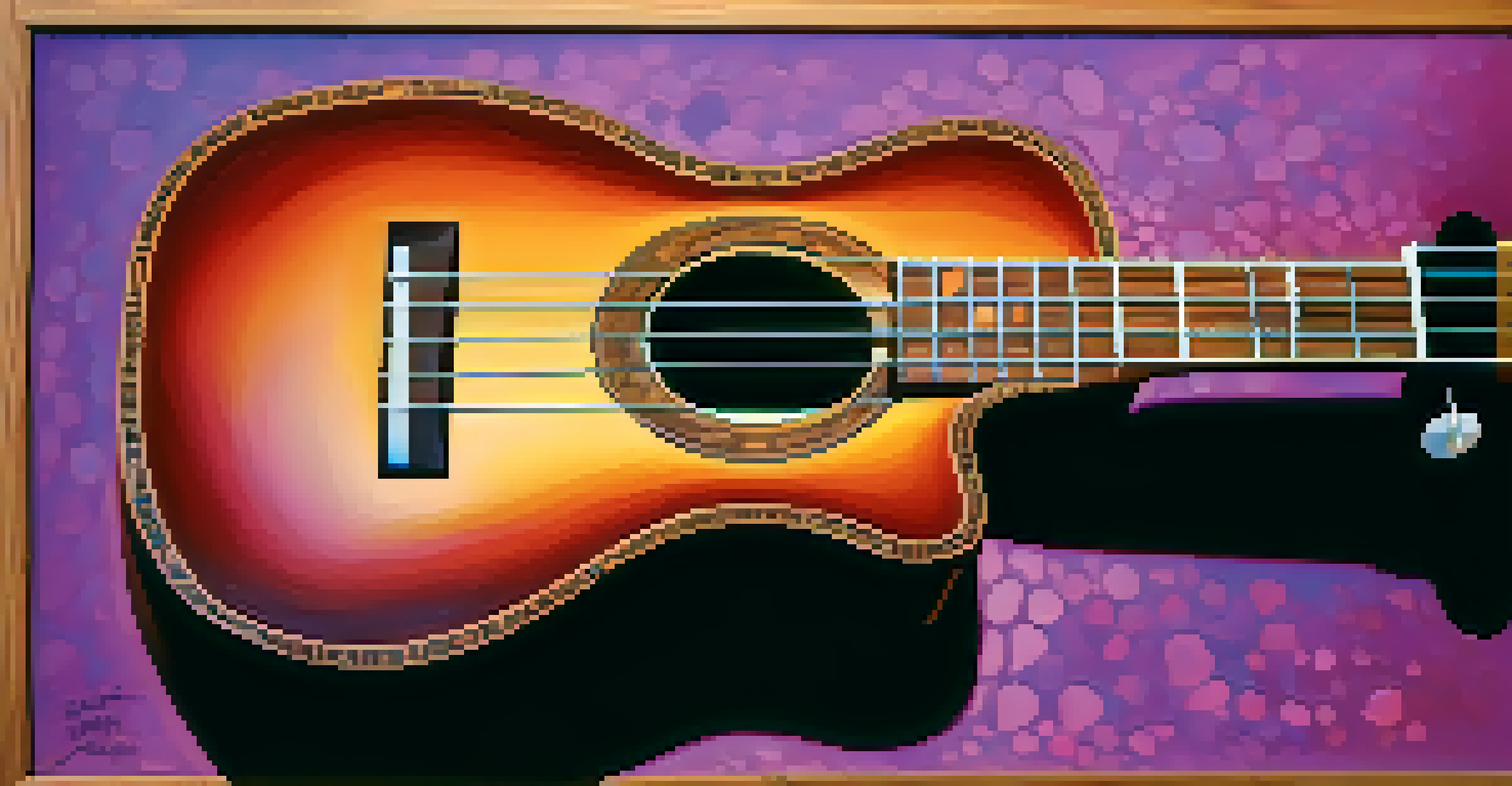Understanding the Ukulele Market: Trends and Growth Opportunities

The Ukulele's Rise in Popularity: A Cultural Phenomenon
Over the past decade, the ukulele has transformed from a niche instrument to a mainstream favorite. This shift can largely be attributed to its cheerful sound and accessibility, making it appealing to a wide audience. Social media platforms have played a significant role, with viral videos and tutorials sparking interest among younger musicians.
The ukulele is a great instrument for beginners because it's so easy to learn and play.
The simplicity of learning the ukulele, often compared to guitar, allows budding musicians to pick it up quickly. Many schools are even incorporating ukuleles into their music curriculum, further driving its popularity. This cultural embrace signals a bright future for the instrument in both educational and recreational settings.
As more people share their ukulele journeys online, the community continues to grow. From local jam sessions to international festivals, the ukulele's presence is felt everywhere. This thriving culture not only sustains interest but also creates numerous opportunities for businesses in the music industry.
Key Demographics: Who's Playing the Ukulele?
Understanding the demographics of ukulele players is crucial for market growth. While traditionally associated with children and beginners, recent data shows that adults, particularly in their 20s and 30s, are increasingly picking up the instrument. This trend reflects a broader desire for creative expression and stress relief through music.

Moreover, the ukulele appeals to diverse groups, including educators, hobbyists, and even professional musicians. Its versatility means it can be used in various genres, from pop to traditional Hawaiian music. This wide appeal opens doors for targeted marketing strategies aimed at different segments of the population.
Ukulele's Popularity Soars
The ukulele has gained mainstream appeal due to its cheerful sound and accessibility, attracting a diverse audience.
The growing interest among older adults also deserves attention, as many seek activities that promote mental well-being and social engagement. Ukulele clubs and classes designed for seniors are springing up, providing not just a musical outlet but also a sense of community. Recognizing and catering to these demographics can significantly enhance market opportunities.
Market Trends: Innovations in Ukulele Design
The ukulele market is experiencing exciting innovations in design and materials. Manufacturers are experimenting with sustainable woods, such as bamboo and mahogany, to create eco-friendly instruments. This trend not only appeals to environmentally conscious consumers but also enhances the quality of sound production.
Music is a world within itself; it's a language we all understand.
Customizable options have also gained traction, allowing players to personalize their instruments. From vibrant colors to unique shapes, these innovations cater to individual tastes and preferences. As a result, more people are inclined to invest in ukuleles that reflect their personality and style.
Additionally, technology is making its mark with the introduction of electric and hybrid ukuleles. These models offer players new possibilities for sound and amplification, attracting a younger audience eager to integrate modern elements into traditional music. As these trends continue to evolve, they present exciting growth opportunities for manufacturers.
Online Sales and E-Commerce: The New Marketplace
The way instruments are sold has drastically changed, with e-commerce taking center stage. Online platforms now provide an accessible marketplace for ukulele enthusiasts to explore a wide variety of options from the comfort of their homes. This shift has made it easier for consumers to compare prices and read reviews before making a purchase.
Social media and influencer marketing also play a pivotal role in driving online sales. Influencers showcasing their ukulele skills can spark interest and lead to increased sales for brands they promote. This trend highlights the importance of digital presence in reaching potential customers and building brand loyalty.
E-Commerce Transforms Sales
Online platforms are reshaping how ukuleles are sold, making it easier for consumers to explore options and learn the instrument.
Furthermore, online tutorials and classes are making it simpler than ever for new players to learn the instrument. Many retailers are now partnering with educators to offer bundled packages that include a ukulele and access to online lessons. This integration of sales and education not only supports new players but also boosts market growth.
The Role of Community: Building a Ukulele Network
Community engagement is a vital component of the ukulele market. Local clubs and online forums create spaces for players to connect, share tips, and collaborate. This sense of belonging fosters loyalty and encourages players to invest in their instruments and related accessories.
Events such as ukulele festivals and workshops bring enthusiasts together, celebrating the joy of music. These gatherings not only promote the instrument but also stimulate local economies. Businesses can tap into this community spirit by sponsoring events or offering group discounts, thereby enhancing their visibility.
Moreover, partnerships with educational institutions can strengthen community ties. Schools that host ukulele programs or clubs provide a platform for students to showcase their skills, further promoting interest in the instrument. By nurturing these community connections, brands can create lasting relationships with their customers.
Challenges in the Ukulele Market: Competition and Saturation
While the ukulele market is thriving, it faces challenges, particularly from increasing competition. With numerous brands entering the space, consumers are often overwhelmed by choices. This saturation can make it difficult for new entrants to differentiate themselves and gain market share.
Additionally, maintaining quality amidst rising production demands is crucial. As more manufacturers scale up, the risk of compromising craftsmanship increases. Brands that prioritize quality over quantity will likely stand out and cultivate a loyal customer base.
Community Drives Engagement
Local clubs and events foster a strong sense of community among ukulele players, enhancing brand loyalty and market growth.
Lastly, keeping up with changing consumer preferences is essential. Trends in music and lifestyles evolve, and brands must adapt to remain relevant. By staying attuned to market shifts and listening to consumer feedback, companies can navigate these challenges effectively and seize new opportunities.
Future Outlook: Growth Potential in the Ukulele Market
Looking ahead, the ukulele market is poised for substantial growth. The increasing interest in music education and the rising popularity of DIY culture contribute to a promising outlook. As more individuals seek creative outlets, the demand for ukuleles is likely to continue its upward trajectory.
Technological advancements will also play a pivotal role in shaping the market. Innovations in instrument design, such as smart ukuleles that connect to apps for learning, will attract tech-savvy consumers. This intersection of technology and music is a key area for brands to explore.

Finally, expanding into new markets, such as developing countries where music education is gaining traction, presents another significant opportunity. By tailoring products to meet the needs of these markets, brands can tap into a growing customer base. The future of the ukulele market looks bright, filled with potential for those willing to innovate and adapt.